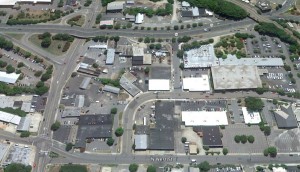Joe Minicozzi, a new projects manager of a firm which drove the revitalization of downtown Asheville has taken his show on the road, convincing other cities:
If you’ve got underutilized buildings in your downtown, do anything you can to fix them up, because that’s where your wealth comes from.
The bottom line is that per acre, high density areas have the potential to generate much more public wealth than low-density subdivisions or massive suburban malls. Taking into consideration the revenue they bring in, downtowns cost considerably less to maintain in public services and infrastructure.
Growth in low density development works like a pyramid scheme.
Low density development isn’t just a poor way to make property-tax revenue, it’s extremely expensive to maintain. In fact, it could only be feasible if we’re expanding development at the periphery into eternity, forever bringing in revenue from new construction, helping to pay for the existing subdivisions we’ve already built.
It would take 600 single-family homes on a 150-acre subdivision to equal the tax base of the 30-story Wells Fargo Capitol Center downtown. And it sits on 1.2 acres of land.
This simple math is important for residents to understand, and particularly for those still hesitant to support investments in public transit.
Transit authorities are currently holding public forums to inform residents about the Wake County Transit Plan, and to build local support for its approval. Improved availability of public transit is a critical part of the infrastructure necessary to encourage higher density development and attract more residents to live in urban areas like downtown Raleigh.
Higher density development downtown keeps taxes low.
This is the simple message for all those who complain that the city is investing too much inside the belt line or in downtown Raleigh.
And while Raleigh has not been as hard hit as other cities, property values and their associated tax revenues have fallen. By utilizing the economics of land use, Raleigh can continue to grow and avoid the need to raise taxes or cut city services.
Information included in the post taken from an article posted in the online publication from <www.theatlanticcities.com>.

0 Comments
1 Pingback